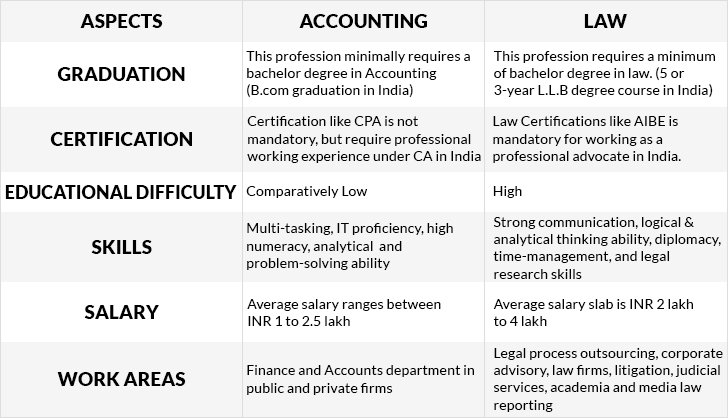
Accounting and law are two popular professions among college students due to their strong income potential, upward mobility, and diverse career paths. Professionals in both fields can find employment in the public sector, such as federal government agencies, states, or municipalities, as well as the private sector, including businesses and non-profit organizations. Within the private sector, there are two primary types of work environments: “external,” where professionals work at firms with other accounting or legal professionals that offer services to various clients, and “internal,” where they work directly for a specific company or organization. Additionally, accountants and lawyers have the option to work independently.
While both kinds of professionals would deal with the business concerns for the firms and individuals, they specialize in various things: attorneys with the concern of law and lawful procedures, accountants with numbers, tax statutory and codes. Both fields need other, specialized study above a normal college degree, and the passing of the exam to obtain the state license to practice (not essential for all accountants, but suggested straightly).
What is Accounting?
Accounting is the procedure of recording financial transactions related to a business. The accounting process consists of summarizing, analyzing, and reporting these transactions to oversight agencies, regulators, and tax collection entities. The financial statements that have been used in accounting are summaries of the financial transactions for the accounting duration, summarising the company’s operations, fiscal positions, and cash flows.
What is the Meaning of Law?
Law in India has engaged from religious prescription to the present constitutional and legal system we hold today, moving via the secular legal system and the common law.
India has recorded the lawful history initiated from the Vedic ages and some civil law systems might have been in place in the Bronze Age and the Indus Valley civilization. Law as a matter of religious prescriptions and philosophical discourse has an illustrious history in India. Emanating from the Vedas, the Upanishads, and other religious texts, it was a fertile field enriched by practitioners from different Hindu philosophical schools and later by Jains and buddhists.
From region to region and ruler to ruler, the secular law in India differs. The court systems for civil and criminal concerns were mandatory specifications of various ruling dynasties of medieval India. Beneath the Mauryas (321-185 BCE) and the Mughals (16th – 19th centuries) was a good secular court system that lived with the latter providing the method to the current common law system.
Fill Form for Law & CA Website with Responsive Design Templates
A Brief Overview of the Relationship Between Accounting vs Law:
In the current business environment, pursuing a career in Law and Accounting enables college graduates to reap higher salaries, rapid promotions, and a multitude of career options. On one end, young graduated accountants can work for big public accounting firms. Similarly, they can also provide services like internal auditing and tax return filing to both individuals and companies.
On the other hand, the law profession allows graduates to explore multiple career paths. Such young attorneys can work in different areas like criminal, defence, corporate, personal injury law, and international law. Comparing both professions side-by-side, it can be stated that accounting requires less educational requirements, whereas the law profession tends to pay more to individuals.
Career in Accounting and Law:
In terms of career prospects, any individual with a bachelor’s degree or even less can sometimes get an accountant job. However, in the case of top accounting firms like KPMG and Deloitte, candidates need to sit and clear the Certified Public Accountant (CPA) exam globally.
In India, students must have a commerce graduate degree and practical working experience under a certified CA to become an accountant. Students can also complete the CA and M.com degrees after the commerce graduate degree or B.com. Working as an accountant also requires one to be highly skilled and organized, along with strong diplomacy skills. The accounting profession also offers lifestyle bonuses like increased time for parental leaves, telecommuting, and flexible hours, but is also considered somewhat boring and socially maladjusted.
Read Also: Legal Services Solutions | India’s Best Law Firms in 2025
On the other hand, a career in the law profession requires a bachelor’s degree in Law (i.e. L.L.B. in India) from a government-recognized and certified law institution. After completing the LLB degree, one should also enrol himself/herself under any State Bar Council and must clear the national exam (All India Bar Examination [AIBE] in India) to become a certified advocate, whereas it is not mandatory to clear the CPA certification in an accounting job in India.
A career in the law profession also requires a wide array of skills among college graduates. These skills include long-working hours ability, excellent communication skills, understanding of multiple languages, legal research skills, analytical and logical reasoning, IT competency, time management, and knowledge of substantive national law and legal procedures.
Salary Comparison between Accounting and Law Professions:
If we talk about salary, then in general, lawyers simply make more money in comparison to accountants right after graduating globally.
In the case of India, the situation is more or less the same, as the average salary of an accountant is around INR 1.5 lakh to 2 lakh per year, whereas in the case of lawyers, the median average salary wage slab boosts up to INR 2 lakh to 4 lakh per year. Such statistics clearly show that choosing the law profession is undoubtedly more rewarding in terms of financial perks in India, but requires more educational qualifications in comparison to accountancy.
Here is a tabular comparison between accounting vs law in terms of varied aspects like growth, salary, and job prospects:-
Conclusion:
Overall, it can be summarized that a career in accounting has less rigid educational requirements in comparison to the law profession. However, when it comes to financial earnings, lawyers can reap greater financial perks in comparison to accountants, thanks to their engagement in diverse areas of work life.
Despite this, choosing a relationship between law vs accounting of these professions should be based on the criteria of one’s skill set. One should not choose the law profession just because it offers more financial stability, but it should be chosen when one possesses skills like excellent communication, logical and analytical thinking, and diplomacy.
Monitoring your finances is no longer complicated, as by making a professional and user-friendly accounting, legal, and bookkeeping website, you can simplify your financial operations and regulate your business. CA Portal streamlines the building of professional websites as per the client’s requirements. You can proceed on the website of the CA portal to discover the variety of available options for bookkeeping, legal, and accounting website design development.
In this guide, I will provide you with step-by-step instructions on how to create an accounting & bookkeeping website and a legal website. With this website, you can stay organized, maintain accurate records, and make informed business decisions. I will cover everything from selecting the appropriate platform to customizing your website to integrating essential features and tools.
Read on to discover how to create a website that can take your financial operations to the next level.









